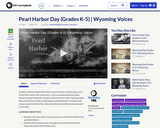
Students will learn about World War II and its impact on Wyoming as part of the Pearl Harbor Day observance.
- Subject:
- English Language Arts
- Speaking and Listening
- Material Type:
- Activity/Lab
- Lesson
- Provider:
- Wyoming PBS
- Date Added:
- 09/17/2019

Students will learn about World War II and its impact on Wyoming as part of the Pearl Harbor Day observance.
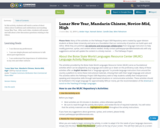
In this activity, students will watch a series of short videos about traditions and celebrations surrounding Lunar New Year . After each video, students will answer and talk about a few discussion questions relating to the videos.
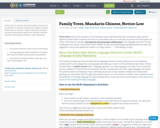
In this activity, students will work together to interview one another to construct family trees. Students will pair off and ask one another a series of interview questions and draw their partners family tree. Students will then introduce their partners family to other classmates.

In this activity students will practice ordering food, discussing their meal, and paying for their meal.
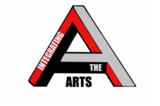
This resource was created by Jenna McAfee, in collaboration with Dawn DeTurk, Hannah Blomstedt, and Julie Albrecht, as part of ESU2's Integrating the Arts project. This project is a four year initiative focused on integrating arts into the core curriculum through teacher education, practice, and coaching.

This lesson asks students to dig into a select scene to examine the complex and stereotype-defying character of Lady Macbeth.
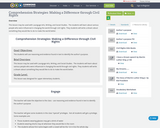
This lesson may be used with Launguge Arts, Writing, and Social Studies. The students will learn about various people who were influencial in changing the world through civil rights. They students will write a dream about something they would like to do to make the world better.
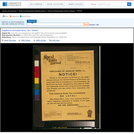
Poster is text only, printed on company letterhead. Text continues: Owing to the peculiar conditions of war possibilities between the United States and Germany, we must insist that all employees of this Corporation be Americans by heart, disregarding their place of birth, and absolutely refrain from using any other language than English, and also refrain from discussing war conditions. This country gives you a livelihood-be loyal! We, Gossler Bros., have never used any discrimination regarding nationality or religion in the past, nor will we now and the future. We are Americans! Gossler Bros., Inc. Forms part of: Willard and Dorothy Straight Collection.

D-Lab Development addresses issues of technological improvements at the micro level for developing countries—in particular, how the quality of life of low-income households can be improved by adaptation of low cost and sustainable technologies. Discussion of development issues as well as project implementation challenges are addressed through lectures, case studies, guest speakers and laboratory exercises. Students form project teams to partner with mostly local level organizations in developing countries, and formulate plans for an IAP site visit. (Previous field sites include Ghana, Brazil, Honduras and India.) Project team meetings focus on developing specific projects and include cultural, social, political, environmental and economic overviews of the countries and localities to be visited as well as an introduction to the local languages.
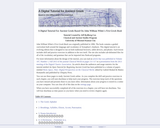
John William White's First Greek Book was originally published in 1896. The book contains a guided curriculum built around the language and vocabulary of Xenophon’s Anabasis. This digital tutorial is an evolving edition that is designed to run on both traditional browsers, tablet devices, and phones. Each lesson includes drill and practice exercises in addition to the text itself. The site also includes tab-delimited files for all of the vocabulary and grammar that can be imported into flashcard programs.
For more information about the design of the tutorial, you can read an article that was published in Volume 107, Number 1, Fall 2013 of the journal Classical World on pages 111-117 or a presentation from the 2013 meeting of the Digital Classics Association. An article about the audiences and usage statistics for the tutorial entitled An Open Tutorial for Beginning Ancient Greek has been published in a volume of papers entitled Word, Space, Time: Digital Perspectives on the Classical World. edited by Gabriel Bodard & Matteo Romanello and published by Ubiquity Press.
You can use these pages to study Ancient Greek online. As you complete the drill and practice exercises in each chapter, you will earn drachmas to help track your progress. The exercises keep track of the questions you have missed and presents those to you more often. Information about your progress is stored in a cookie on your computer. You can clear all of this data on the settings page.
When you have successfully completed all of the exercises in a chapter, you will have ten drachmas. You will lose drachmas as time passes so you know when you need to review chapters again.
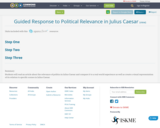
Students will read an article about the relevance of politics in Julius Caesar and compare it to a real-world experience as well as create a visual representation of its relation to specific scenes in Julius Caesar.
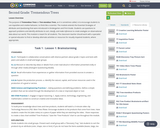
Tremendous Trees or Tree-mendous Trees encourages students to use inquisitive and creative behaviors, to think like a scientist. The module extends the Essential Strategies of Attributes and Questioning introduced in Kindergarten and First Grade. Students use questions to approach problems and identify attributes to sort, classify, and make inferences to create analogies on observational data about our world using this module for all students. The classroom teacher should work with a specialist or special educator to find or develop alternate activities or resources for visually impaired students, where appropriate.
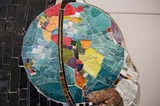
This unit explores the various ways information and ideas about climate change are presented through a variety of media. This includes the evaluation of social media posts, research into climate change issues, and an exploration of contemporary art and artists. This was designed and taught in an honors 9th grade English Language Arts Classroom by Dr. Tavia Quaid in response to student interest in climate change and to reinforce key information literacy skills.
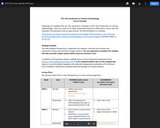
Introduction to Cultural Anthropology course calendar using the open textbook Perspectives: http://sacc.americananthro.org/publication/open-source-textbook/
Course Description
Considers contemporary human cultures from an anthropological perspective. Covers fieldwork, language, race, gender, sex and marriage, kinship, politics, world view, religion, economics, and globalization from a cross-cultural perspective. This course compares cultures found around the globe, focusing closely upon at least two specific cultures, with extended discussion of additional cultures and societies as appropriate. Greater understanding of particular cultures will be achieved through an application of the comparative method.
Upon completion of the course students should be able to:
Describe basic concepts, methods, and theories associated with cultural anthropology.
Use an understanding of anthropology to identify and compare values, beliefs, norms, economic systems, and social organization or institutions in a variety of societies in different world regions.
Examine systems of power and social justice issues related to U.S. society and other cultures from an anthropological perspective.
Explore fieldwork methods and ethical considerations of doing anthropological fieldwork.
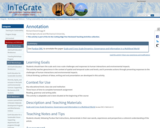
Use Purdue OWL to annotate the paper Scale and Cross-Scale Dynamics: Governance and Information in a Multilevel World
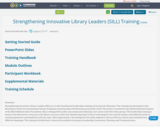
Strengthening Innovative Library Leaders (SILL) is a 2-day foundational leadership training curriculum for librarians. The training was developed at the Mortenson Center for International Library Programs in partnership with librarians around the world. The project is funded by the Global Libraries Program of the Bill & Melinda Gates Foundation.
SILL is designed for public and community librarians, but can be used with other groups. This leadership training is meant to be delivered to everyone in the library, not just a select few. Equally important is that it is developed to be used by trainers with different levels of training experience and familiarity with the topic. Most importantly, it was designed to be easily adapted to the local library context and translated into different languages.
The training is divided into 4 interactive modules focusing on Leadership, Innovation, Planning, and Communication.
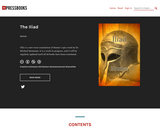
Short Description:
A new, 21st century verse translation of Homer's epic work, translated by Michael Heumann.
Long Description:
There is no greater introduction to world literature than Homer’s Iliad. The great epic poem tells the story of the Bronze Age war between the Achaeans (Greeks) and Trojans, the great warriors who did the fighting, the woman they were fighting for (and fighting over), and the gods who egged them on.
This is a new, 21st century verse translation by Michael Heumann. It seeks to retain the spirit and language of Homer’s original Greek while making it readable and enjoyable for a modern audience.
Michael Heumann is a Professor of English at Imperial Valley College in California. He holds a PhD in English from the University of California, Riverside. This is his first translation.
Word Count: 149411
(Note: This resource's metadata has been created automatically by reformatting and/or combining the information that the author initially provided as part of a bulk import process.)
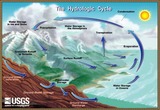
Students will be working with the problem “How do we know water is safe to drink?” under the theme of “How does access to clean water and sanitation affect a culture?” Students participate in labs related to the hydrologic cycle and water quality. Students design and build a local watershed to model the movement of water across land. Students also research and explore print, video, and audio resources for news and information about local / global water pollution / impact by and on humans.Students share what they have researched with each other, then create an artifact (infographic, video, slideshow, animation, comic strip, etc) intended to educate peers and younger students about water quality and its importance. Ideally, finished products would be shared with others in an authentic setting.Standards:Ohio Science Standards (Grade 7)CCSS English Language Arts (Grade 7)
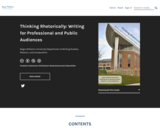
Thinking Rhetorically: Writing in Professional and Public Contexts is dedicated to introducing students to a lifelong commitment of engaging with these problems that matter. As an academic discipline, Writing Studies’ contribution to engaging with problems can be applied to all areas of study and to all types of problems because we focus on the way language itself—discourse—is created and exchanged in the service of engaging problems. Writing Studies deepens students’ rhetorical awareness of how the ongoing conversations between groups of people shape and express the problems that matter. According to Aristotle, being rhetorically aware means understanding “the best means of persuasion in any given situation.” It means understanding the deep logic that explains why an author has selected a particular genre to deliver a particular message to an audience. We all know writing is hard, but we commit to writing well because of the vital work it does in the world in helping humans preserve and extend our ability to come together. As theorist Anne Beaufort writes, “[w]hat writing expertise is ultimately concerned with is becoming engaged in a particular community of writers who dialogue across texts, argue, and build on each other’s work.”

This subject is a computer-oriented introduction to probability and data analysis. It is designed to give students the knowledge and practical experience they need to interpret lab and field data. Basic probability concepts are introduced at the outset because they provide a systematic way to describe uncertainty. They form the basis for the analysis of quantitative data in science and engineering. The MATLAB® programming language is used to perform virtual experiments and to analyze real-world data sets, many downloaded from the web. Programming applications include display and assessment of data sets, investigation of hypotheses, and identification of possible casual relationships between variables. This is the first semester that two courses, Computing and Data Analysis for Environmental Applications (1.017) and Uncertainty in Engineering (1.010), are being jointly offered and taught as a single course.